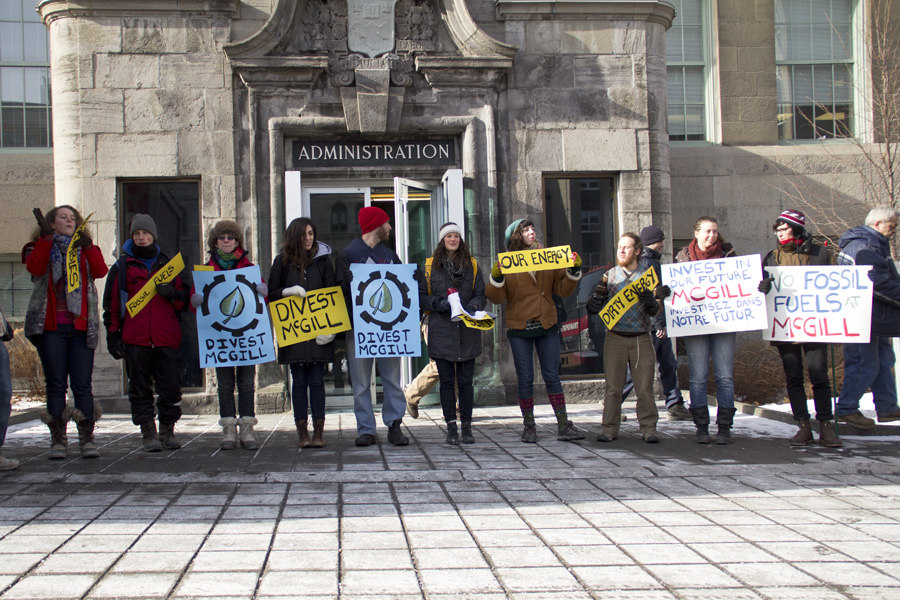Following the McGill University Board of Governors’ (BoG) vote against adopting Divest McGill’s proposed actions, the Mar. 23 Senate meeting had members discussing transparency in McGill’s finances and actions. Maintaining ethical research behaviour was another topic of deliberation, as well as ensuring that no student final evaluations weighted higher than 75 per cent.
Fossil fuel divestment
The BoG announced on Wednesday that McGill will not divest from its holdings in fossil fuel industries.
Students’ Society of McGill University (SSMU) Medicine Representative David Benrimoh raised concerns over the secrecy surrounding the BoG vote, blaming both the abrupt scheduling of the meeting and the increased security presence.
“[Divest McGill] is such a huge issue on this campus, it has raised so many concerns, that to think it was an oversight that led to such an important decision being made public immediately before the [the Senate meeting], where most likely students will come to voice their dissent is very concerning,” Benrimoh said. “I must say that the appearance of this is unfortunately in line with past appearances that led students to criticize with respect to openness and transparency.”
Provincial budget
Following the tabling of provincial budget on Mar. 17, Principal Suzanne Fortier emphasized the increased stability of McGill’s previously uncertain finances.
“This is the first time in quite a number of years that the university sector will not be asked to absorb a cut to reach a balanced budget,” Fortier said. “We are now moving to a different place and a different regime where we will see investments.”
Financial prospects were increased investments into the university sector. The federal government allocated $2 billion to infrastructure and $95 million to the Granting Council, a government council that assigns grants to university research projects.
“As you can imagine, with the no cuts coupled with investment, it means we’re in a much better situation than we’ve been in previous years,” Fortier said. “It’s now our time and our turn to show that we’re going to be there as a strong research and academic community to be important key players in making good of these great investments.”
Revision to examination policies
Deputy Provost (Student Life and Learning) Ollivier Dyens spoke of his ongoing intention to revise the student assessment policy, introducing a motion to prohibit professors from giving final exams weighing over 75 per cent of the grade without providing alternatives.
“This is the first step in a series of revisions we’re going to bring to the student assessment policy,” Dyens said. “The current student assessment policy does not allow for more than seventy-five percent for final exams but there were too many loopholes in that policy and we wanted to close these loopholes.”
The Faculty of Law is exempt from this policy. Dyens’ future revisions are expected to be complete by December 2017.
Ethical research
Vice-Principal (Administration and Finance) Michael Di Grappa reaffirmed Senate’s stance against unethical suppliers of research materials. In particular, the focus was on responsible animal use in health and biomedical research, with Santa Cruz Biotechnology being a recent offender.
“We wrote to [Santa Cruz Biotechnology] some time ago after this issue was brought to our attention in terms of practices with respect to animal welfare,” Di Grappa said. “We are working on a supplier code of conduct that we will include in every contract going further.”
Senate also passed a motion to establish a statement on academic freedom.
“The scholarly members of the university have the freedom to pursue research and artistic creation and to disseminate their results, without being constrained by political or disciplinary orthodoxies, monetary incentives, or punitive measures as a result of their academic pursuits,” the statement reads.
Faculty of Arts Senator John Galaty clarified the reasons for creating this statement.
“Of course [there] is no intention to diminish the importance of accuracy and referral to findings in the field that we would expect any teacher or instructor to follow,” Galaty said. “[But] does this belong as part of an assertion or a statement of academic freedom? I think not.”
Creating a healthy community
The meeting closed with Benrimoh’s presentation on the Quebec Health Professional Students’ Roundtable—a newly formed group that it intends to hold an open public summit discussing Quebec health policies.
“We’re looking to hold the first true consultation on the future of Quebec health policy that this province has seen, to our knowledge,” Benrimoh said. “So if you care about health care, if you’ve ever been a patient yourself, or have families that have, or if it’s something you are peripherally interested in, please come, we’d love to see you there.”








